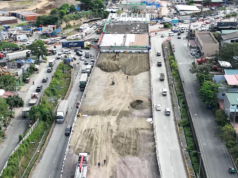CLARK FREEPORT – The Department of Health (DOH) said some 5,000 documented and non-documented overseas Filipino workers (OFW) in three Ebola-plagued West African countries have been spared so far from the dreaded ailment that has already prompted the US to issue “high alert.”
This, even as DOH spokesperson Dr. Lyndon Lee Suy, at a press conference here, expressed confidence that seven OFW’s who are being monitored after arriving recently from Guinea, Sierra Leone and Liberia, have remained also healthy and are expected to be cleared by the Research Institute for Tropical Medicine (RITM).
Some 15 OFW’s based in the Western African countries returned in separate days recently amid the Ebola outbreak.
Eight of them, including three who later suffered from fever, had already been cleared after the DOH’s 30-day observation period. The seven others are under the 30- day monitoring but have remained healthy, Suy noted.
Suy said that while there is no absolute assurance that Ebola would not affect the Philippines, the country has remained Ebola-free as of yesterday.“We have to acknowledge the problem is there, but we must do our very best to prevent Ebola from reaching our shores,” Suy said during the regional conference on “emerging and re-emerging infectious diseases” held by the DOH here.
Suy said all measures are being adopted by the DH in coordination with other government agencies to make sure that Ebola does not reach the country. “If it does, we are doing our best to curb its spread early on,” he added.
Passengers from the West African countries who manifest fever at the country’s international airports would not be allowed to proceed to their local destinations and instead be picked up at the airport by DOH personnel who could bring them to the nearest hospital for examination.
“We cannot hold any passenger from West Africa at the airport unless they manifest fever and other symptoms that would be associated with Ebola,” he added. Suy said the DOH has an agreement with the Bureau of Immigration (BI) in identifying passengers from West Africa.
“Even if they are healthy upon landing at the airport, we talk to them so that we could establish regular communication with them for the next 30 days and make sure they do not manifest Ebola symptoms. He noted that while the incubation period of the Ebola virus is known to be 21 days at most, the DOH has extended monitoring of the OFWs to 30 days.
Suy also said that the government has maintained ban in sending OFW’s to Guinea, Sierra Leone and Liberia because of Ebola threat in the three countries. “But we are not telling the 5,000 Filipinos there to come home, because they have been there for some time and we presume they would know better how to avoid being Ebola victims,” he added.
He noted that that there are more Filipinos in Nigeria, where reports of Ebola have also surfaced, and that more Nigerians come to the Philippines than nationalities from the three other West African countries. So far, however, there is yet a ban to sending OFWs to Nigeria, he added, but did not give any reason for this.
Asked whether family members should refrain from physical contact with relatives arriving from West Africa until after the 30-day monitoring period, Suy said the DOH has not adopted this policy as this might only promote stigma on the OFWs and discourage them from reporting any sign of illness to health officials.




